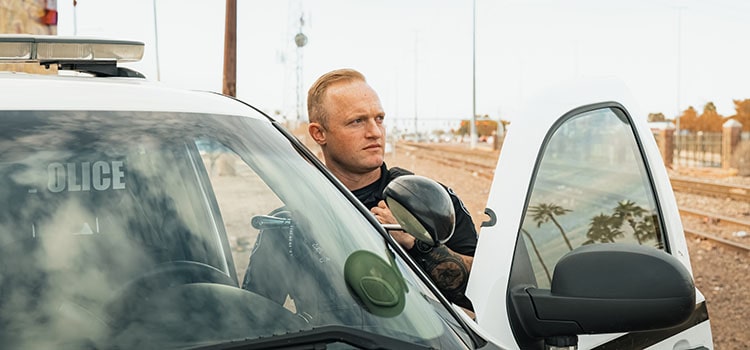In this article
Learn how to become a police officer in Illinois
The Illinois Law Enforcement Training and Standards Board (ILETSB) is responsible for certifying law enforcement personnel across the state. Any prospective police officer in Illinois should familiarize themselves with the ILETSB to understand the policies and procedures of pursuing a career in law enforcement.
Despite its name, the ILETSB does not create or control minimum statewide qualifications for police officers in the state. Rather, they establish education standards and verify that officers successfully complete the requirements of their employing agency in order to issue certifications.
“Our role is establishing standards essentially within law enforcement, but oftentimes it’s limited by legislation. There are no minimum standards put forth by our agency to be a police officer,” said Paul Petty, a 28-year law enforcement veteran and the in-service manager of training for ILETSB.
7 steps to become a police officer in Illinois
Meet minimum standards for Illinois.

Although the state of Illinois itself does not outline minimum requirements to be a police officer, you will have to be at least 21 years of age, a U.S. citizen, and pass a fingerprint background check in order to be a police officer in Illinois. You should also have a high school diploma or GED.
Consider earning a college degree or starting postsecondary education.

Some law enforcement agencies in IL may require their officers to have a certain amount of postsecondary education. Furthermore, a degree may be necessary to advance up the chain of command later in your career. A college degree in a subject such as criminal justice, criminology or a related filed could be beneficial for your short and long term career.
Apply for law enforcement positions.

You must be sponsored by an IL law enforcement agency in order to attend a basic law enforcement training academy or BLE. Check out each agency’s individual requirements to make sure you meet their minimum qualifications, since it can vary agency to agency. Once you are accepted into a position, they will send you to a BLE academy.
Pass the POWER test.

BLE academies require candidates to complete and pass the Peace Officer Wellness and Evaluation Report or POWER test prior to starting training. This physical fitness exam tests you on your aerobic capacity, strength and flexibility. Passing scores differ and are based on gender and age group.
Complete minimum basic law enforcement instruction (BLE).

There are two types of basic programs you may attend: full-time or part-time. Full-time academies take about 580–620 hours of instruction. Part-time academies are a combination of online trainings done at the officer’s own pace and in-person training on the weekends. Part-time trainings are designed more for people who may be transitioning from another career.
Pass the statewide examination.

The ILETSB issues a written exam at the end of your training which you must pass in order to earn your certification. You have a maximum of three attempts to pass the test. If you fail after three attempts, you cannot be a police officer.
Keep up your continuing education requirements.

Police officers in Illinois must complete at least 30 hours of in-service training every three years in order to maintain their certification. Within that requirement, they must receive training in multiple different mandated subject areas.
Minimum qualifications for Illinois police officers
Unlike other states that have clear, statewide minimum qualifications to become a police officer, law enforcement agencies in Illinois determine their own qualifications themselves. That being said, all agencies are going to require at least the following:
- 21 years of age (must be 21 years of age to carry a gun in uniform)
- U.S. citizen
- Pass a criminal background check through fingerprints
“Every entity kind of controls their own,” Petty said. “But the basic fundamentals: you do have to be 21 years old or older to carry a gun, you do have to be a U.S. citizen, you do have to have a fingerprint background check submitted and attested to by us (ILETSB).”
Education requirements
The educational requirement for police offers vary from agency to agency. At minimum, most agencies require officers to have a high school diploma or equivalent, such as a GED. Be that as it may, many law enforcement agencies require recruits to already have some postsecondary education such as an associate or bachelor’s degree, or an equivalent of military experience.
Furthermore, some agencies require officers to have a certain level of education in order to advance up the chain of command. Depending on your individual career goals, it may be in your best interest to invest in a college degree.
A degree in criminal justice may make the most sense for prospective law enforcement officers, but it’s not the only option. Agencies don’t usually require a specific area of study, so you could get a degree in other subjects such as criminology, communications, public health, legal studies and more—even a language degree could make you a highly desirable job candidate.
Additional requirements
In order to become a certified police officer, you have to attend a basic law enforcement academy, or BLE as it is referred to in Illinois. In many areas of the country, you can attend a basic training academy on your own prior to employment or you’ll be sent to an academy on behalf of a sponsoring agency—in Illinois, this is not the case.
“What separates us, generally speaking, is that you have to be sponsored by an agency. And to be sponsored by an agency, it allows the individual agencies to set their own criteria,” Petty said.
That means you apply for positions first before attending a BLE training course. After getting hired, recruits must take the Peace Officer Wellness Evaluation Report or POWER test as a prerequisite to entering any of the certified police academies in Illinois. This is a physical fitness examination that tests candidates on three areas: aerobic capacity or cardiovascular endurance, strength and flexibility.
Full-time vs. part-time
Petty said there are two types of BLE trainings you can attend: full-time or part-time.
“You can attend in person, and that is a 580 to 620 hour training, five days a week. Sometimes you may be required on a Sunday night or a late Friday for different training, but generally you have the weekend off,” Petty said. “And the other opportunity is for those people who may be in another profession and are getting their certificate, transitioning from one profession to another, called our part-time academies. Those are internet-based trainings for the officer on his or her own time, but they will also attend for approximately a 15 to 18 month period on weekends in person.”
Finally, you must pass a standardized BLE certifying exam at the end of your training. “We administer a written test at the end of the academy that an officer must pass to be certified,” Petty said.
Continuing education requirements
“We probably have one of the most strict and busy in-service mandated training requirements in the country,” Petty said.
That’s the result of new legislation that was passed in 2021 called the SAFE-T Act, which reformed many aspects of Illinois’ criminal justice system. Part of these reforms included an expansion of the in-service training requirements for police officers.
“In a nutshell, an officer is required to have a minimum of 30 hours of training in a three-year period which includes 12 hours of scenario-based training, six hours of de-escalation training and six hours of high-risk traffic stop training,” Petty said. “Inside that basic package I just provided, an officer must have training in the following areas: civil rights; constitutional use of law enforcement authority; crisis intervention, cultural competency, de-escalation, emergency medical, high-risk traffic stops, human rights, laws concerning stops, searches and use of force, legal rights, officer safety techniques, officer wellness and mental health, procedural justice, psychology of domestic violence, reporting of child abuse and neglect, and sexual assault and trauma-informed response.”
These training requirements are tracked through ILETSB’s online portal for officers.
Illinois police salary and job outlook
Illinois ranks fifth in the nation among states with the highest employment levels of police and sheriff’s patrol officers. Unsurprisingly, most police officer jobs are concentrated in the Chicago metropolitan area.
Even though employment of police and detectives is expected to grow only 3.3% over the next decade—slower than the average across all occupations—Illinois is no exception to nationwide police recruitment and retention shortages, and this could possibly lead to more employment opportunities and job security. Petty said that some agencies are having to modify their training procedures to get people in the field quicker. For example, officers who wish to join the Illinois State Police generally had to go through their training academy no matter how much law enforcement experience they may already have.
“Nowadays they’re not doing that. They’re hiring the officer and they’re in such desperate need to get people on the streets and in uniforms to fill this void—whether people are retiring or leaving the profession or whatever it is,” Petty said. “So we’re seeing changes.”
State Guides for Prospective Police Officers
Take a look at the steps you’ll need to take to become a police officer in other states:
- Maryland
- California
- Indiana
- New York
- Massachusetts
- New Jersey
- Texas
- North Carolina
- Illinois




